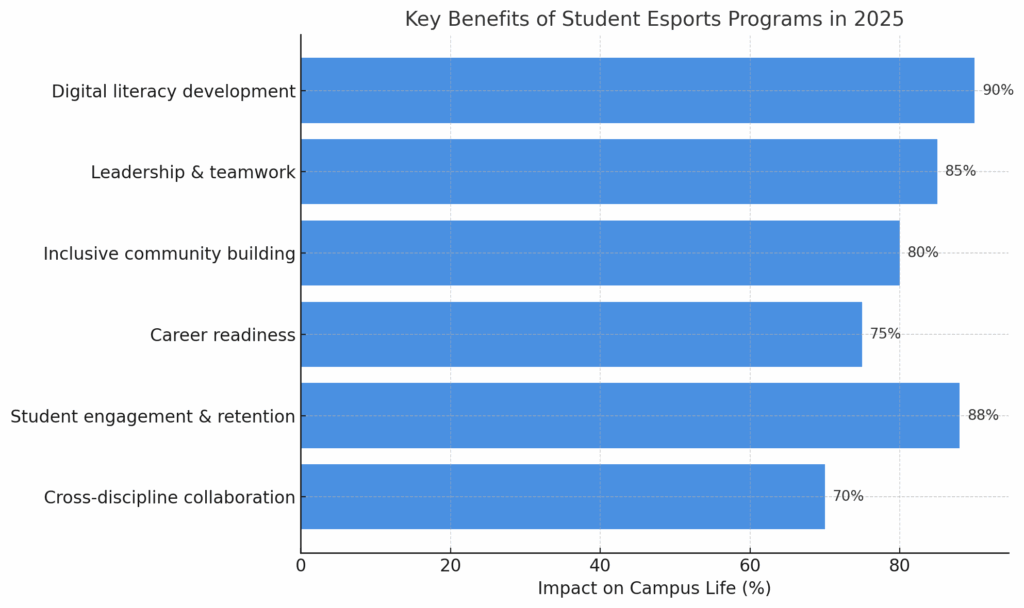Introduction
Students already spend countless hours gaming — often competitively, socially, or as a way to relax. But what if all that screen time could evolve into something more meaningful? In 2025, universities around the world are doing exactly that. By integrating structured student esports programs into campus life, institutions are not only embracing a cultural shift, but actively leveraging gaming to build digital literacy, leadership skills, and a sense of community.
Let’s explore how esports is becoming a cornerstone of modern campus culture — and how tools like SENET make it possible to build sustainable, inclusive programs that keep students connected and engaged.
1. Esports as a New Campus Connector
Traditional college experiences — sports, clubs, events — are now being supplemented (and in some cases, replaced) by esports and gaming communities. Why? Because students are already digitally native, and many of them identify as gamers. Universities that recognize this are using esports as a modern bridge between academic life and social engagement.
Whether through casual play or competitive leagues, student esports programs foster connection among students across disciplines, cultural backgrounds, and interests. A gamer in engineering might end up on the same team as a fine arts major — collaborating, strategizing, and celebrating victories together.
🎮 Key stat: According to Inside Higher Ed, over 70% of Gen Z students identify as gamers, making esports a natural extension of student life.
2. Beyond Gaming: Teaching Digital Literacy and Leadership
Gaming is more than just fun — it’s a high-performance environment that teaches real-world skills. Student esports programs are being used by universities to deliver lessons in:
- Digital literacy – Understanding hardware, game mechanics, streaming platforms, and communication tools.
- Teamwork and collaboration – Roles like support, shot-caller, and strategist mirror those in real-life projects and business settings.
- Leadership development – Students take on roles like team captain, tournament organizer, or coach.
- Time management and accountability – Competing at a high level requires discipline and consistent scheduling.
Esports is helping schools transform students into tech-savvy professionals who can work under pressure, communicate clearly, and adapt fast — all within a highly engaging ecosystem.

3. Campus Engagement Tools That Power Esports Success
To run an esports program successfully, universities need the right infrastructure. This is where campus engagement tools and platforms like SENET come in.
SENET enables universities to:
✔ Manage esports labs and gaming lounges with ease
✔ Automate session control and time tracking
✔ Set up tournament-ready environments without relying on complex IT configurations
✔ Provide user-friendly access to students while keeping systems secure and updated
By simplifying the technical side of esports, SENET empowers faculty and student leaders to focus on building the culture, not troubleshooting machines.
4. Building Inclusive Communities Through Esports
One of the most exciting aspects of student esports is its accessibility. Unlike traditional athletics, esports doesn’t require physical ability, specific gender categories, or a particular body type.
This makes it a perfect avenue for:
✔ Students with disabilities
✔ International students looking for community
✔ Introverted or neurodiverse students
✔ Students with a passion for STEM or tech
In 2025, more universities are positioning esports as a key strategy for diversifying campus engagement and promoting mental well-being through inclusive, purpose-driven play.
5. Esports as a Career Pipeline
Universities aren’t just encouraging students to play — they’re helping them build careers in the gaming and tech industries.
Students involved in esports programs gain experience in:
- Event management
- Streaming and broadcasting
- Game design and modding
- IT and technical support
- Social media and community building
Universities that invest in esports are effectively building in-house incubators for the next generation of digital professionals, all while increasing student satisfaction and retention.
💡 Bonus: Some schools are now offering esports scholarships and dedicated majors/minors in game studies, interactive media, or esports business.
Conclusion
As student interests evolve, so must university life. Esports isn’t just a trend — it’s a movement that merges entertainment, education, and community into one dynamic ecosystem. By investing in student esports programs and smart campus engagement tools like SENET, universities can offer students more than games — they can offer belonging, growth, and real-world opportunity.
Whether it’s cultivating leadership or enhancing digital literacy through gaming, esports is fast becoming a defining feature of modern campus culture. The future is already online — smart campuses are logging in.
FAQ
1. What are student esports programs?
Student esports programs are structured initiatives within universities or colleges that support competitive or recreational gaming among students. These programs often include teams, tournaments, academic support, and access to gaming labs or arenas.
2. Why are student esports programs important?
They promote teamwork, digital literacy, communication skills, and leadership. Additionally, esports programs help boost campus engagement, create inclusive communities, and even open doors to careers in gaming, tech, and media.
3. How can universities start student esports programs?
Launching student esports programs requires identifying interest, forming teams or clubs, providing equipment, and managing infrastructure. Platforms like SENET help simplify access control, time tracking, and tournament preparation.
4. Are student esports programs only for gamers?
No. These programs also involve students in event planning, marketing, broadcasting, IT support, and community management. They offer opportunities for a wide range of academic and creative disciplines.
5. Do student esports programs help with careers?
Yes. They provide practical experience in competitive environments and exposure to the esports industry. Many students go on to careers in game development, content creation, tech support, or professional esports.
6. How do student esports programs impact campus culture?
They create vibrant, inclusive environments that bring together students from diverse backgrounds. They also enhance student retention and satisfaction by offering modern, tech-forward engagement experiences.
7. What tools support student esports programs?
Tools like SENET streamline management of esports labs, enable remote monitoring, automate billing, and enhance security — making it easier for schools to focus on community and performance.

